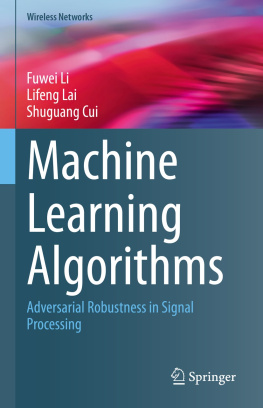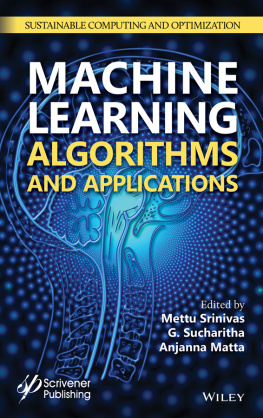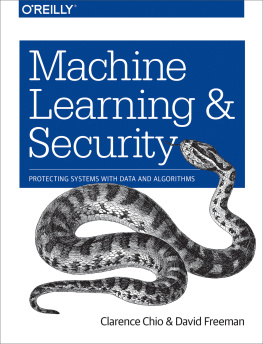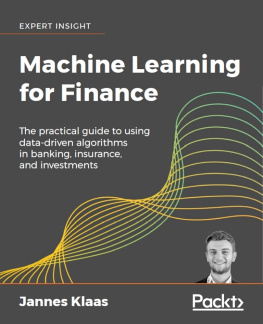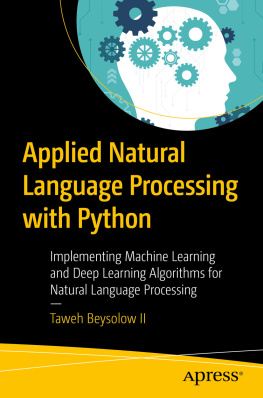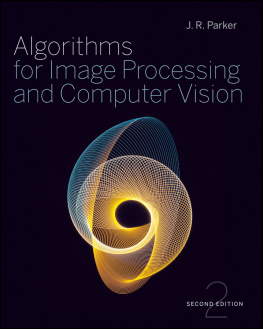Fuwei Li - Machine Learning Algorithms : Adversarial Robustness in Signal Processing
Here you can read online Fuwei Li - Machine Learning Algorithms : Adversarial Robustness in Signal Processing full text of the book (entire story) in english for free. Download pdf and epub, get meaning, cover and reviews about this ebook. publisher: Springer International Publishing, genre: Romance novel. Description of the work, (preface) as well as reviews are available. Best literature library LitArk.com created for fans of good reading and offers a wide selection of genres:
Romance novel
Science fiction
Adventure
Detective
Science
History
Home and family
Prose
Art
Politics
Computer
Non-fiction
Religion
Business
Children
Humor
Choose a favorite category and find really read worthwhile books. Enjoy immersion in the world of imagination, feel the emotions of the characters or learn something new for yourself, make an fascinating discovery.
- Book:Machine Learning Algorithms : Adversarial Robustness in Signal Processing
- Author:
- Publisher:Springer International Publishing
- Genre:
- Rating:4 / 5
- Favourites:Add to favourites
- Your mark:
- 80
- 1
- 2
- 3
- 4
- 5
Machine Learning Algorithms : Adversarial Robustness in Signal Processing: summary, description and annotation
We offer to read an annotation, description, summary or preface (depends on what the author of the book "Machine Learning Algorithms : Adversarial Robustness in Signal Processing" wrote himself). If you haven't found the necessary information about the book — write in the comments, we will try to find it.
Fuwei Li: author's other books
Who wrote Machine Learning Algorithms : Adversarial Robustness in Signal Processing? Find out the surname, the name of the author of the book and a list of all author's works by series.
Machine Learning Algorithms : Adversarial Robustness in Signal Processing — read online for free the complete book (whole text) full work
Below is the text of the book, divided by pages. System saving the place of the last page read, allows you to conveniently read the book "Machine Learning Algorithms : Adversarial Robustness in Signal Processing" online for free, without having to search again every time where you left off. Put a bookmark, and you can go to the page where you finished reading at any time.
Font size:
Interval:
Bookmark:
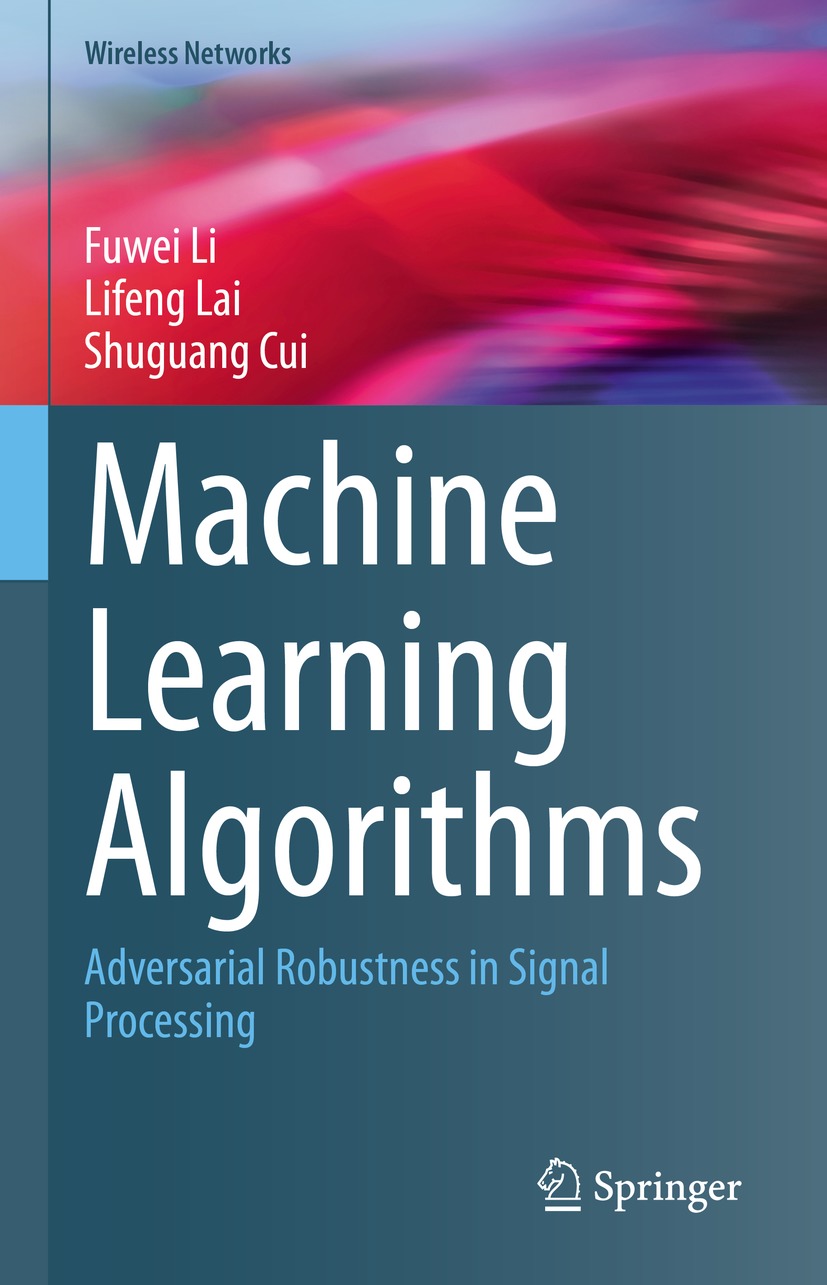
The purpose of Springers Wireless Networks book series is to establish the state of the art and set the course for future research and development in wireless communication networks. The scope of this series includes not only all aspects of wireless networks (including cellular networks, WiFi, sensor networks, and vehicular networks), but related areas such as cloud computing and big data. The series serves as a central source of references for wireless networks research and development. It aims to publish thorough and cohesive overviews on specific topics in wireless networks, as well as works that are larger in scope than survey articles and that contain more detailed background information. The series also provides coverage of advanced and timely topics worthy of monographs, contributed volumes, textbooks and handbooks.
** Indexing: Wireless Networks is indexed in EBSCO databases and DPLB **

This Springer imprint is published by the registered company Springer Nature Switzerland AG
The registered company address is: Gewerbestrasse 11, 6330 Cham, Switzerland
Machine learning has been widely used in signal processing. The success of machine learning in signal processing relies heavily on the quality of the data. However, the diverse data sources make it harder to get very high-quality data. What makes it worse is that there might be a malicious adversary who can deliberately modify the data or add poisoning data to corrupt the learning system. This imposes a significant threat to machine learning in signal processing, for example, in wireless communication, array signal processing, and image signal processing. Hence, it is necessary and urgent to investigate the behavior of machine learning algorithms in signal processing under adversarial attacks. In this book, we examine the adversarial robustness of three commonly used machine learning algorithms in signal processing: linear regression, LASSO-based feature selection, and principal component analysis (PCA). Based on our theoretical analysis, we also carry out adversarial attacks on several signal processing problems, for example, feature selection, array signal processing, principal component analysis, wireless sensor networks, etc.
In the first part, we study the adversarial robustness of linear regression. We assume there is an adversary in the linear regression system, and it tries to suppress or promote one of the regression coefficients. To obtain this goal, the adversary adds poisoning data samples or directly modifies the feature matrix of the original data. We derive the optimal poisoning data sample and propose an alternating optimization method to design the optimal feature modification. We also demonstrate the effectiveness of the attack against a wireless distributed learning system. In the second part, we extend the linear regression to LASSO-based feature selection and study the best strategy to modify the feature matrix or response values to mislead the learning system to select the wrong features. We formulate this problem as a bilevel optimization problem and use a smooth approximation of the ell1 norm function to attain the gradient of our objective function. With the gradient information, we employ the projected gradient method to find the optimal attacks. We also show how this attack influences array signal processing and weather data analysis. In the last part, we consider the adversarial robustness of the subspace learning problem. We examine the optimal modification strategy under the energy constraints to delude the PCA-based subspace learning algorithm and derive the optimal attack strategy to modify the original data to maximize the subspace distance between the original one and the one after modification. We also conduct our attack on a principal regression problem and demonstrate its impacts on the subspace and the regression result.
Direction of arrival
i.i.d.Independent and identically distributed
KKTKarush-Kuhn-Tuck
LASSOLeast absolute shrinkage and selection operator
OLSOrdinary least square
PCAPrincipal component analysis
PCRPrincipal component regression
QCQPQuadratic constrained quadratic program
RMSERoot mean square error
WSNsWireless sensor networks
Machine learning is being used in various applications. Most of the existing machine learning systems make the basic assumption that the data are from normal users and are generated independently from the same distribution. Even though there are algorithms designed to deal with small dense noises and large sparse outliers, few consider the adversarial noises. These noises are intentionally created by an adversary who has some knowledge of the machine learning system and the data. Then, the adversary will deliberately add some carefully designed noises or directly modify the data set in order to corrupt the learning system or mislead the learning system to make a wrong decision. This attack is especially dangerous for some security and safety critical applications such as medical image analysis [].
Font size:
Interval:
Bookmark:
Similar books «Machine Learning Algorithms : Adversarial Robustness in Signal Processing»
Look at similar books to Machine Learning Algorithms : Adversarial Robustness in Signal Processing. We have selected literature similar in name and meaning in the hope of providing readers with more options to find new, interesting, not yet read works.
Discussion, reviews of the book Machine Learning Algorithms : Adversarial Robustness in Signal Processing and just readers' own opinions. Leave your comments, write what you think about the work, its meaning or the main characters. Specify what exactly you liked and what you didn't like, and why you think so.

